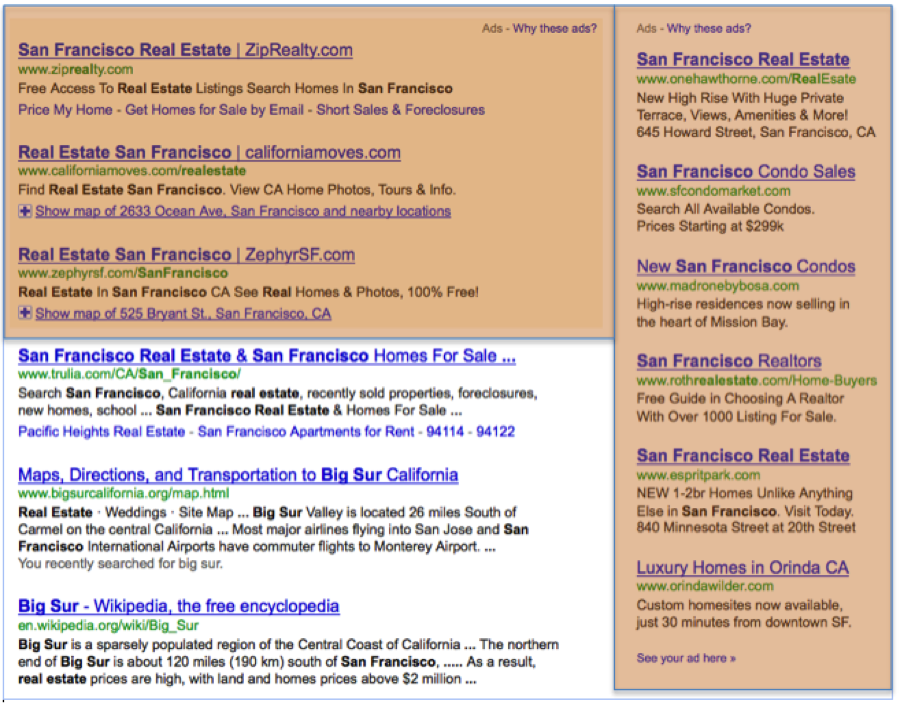You are viewing our site as an Agent, Switch Your View:
Agent | Broker Reset Filters to Default Back to List3 Keys to PPC for Real Estate
January 17 2012
There’s been ample debate about the benefits of PPC for real estate professionals. Before you choose a position for or against PPC, it’s important to have a clear understanding of exactly what you’re talking about. So here’s a crash course on the basics.
Much of our discussion here is courtesy of a very informative HubSpot eBook. You can download the eBook at HubSpot.com.
Pay-Per-Click 101
First off, PPC stands for “pay-per-click” advertising. And it is what it sounds like – you create an ad and pay every time someone clicks on it. But where do PPC ads live? On search engines of course! Not just Google, but Yahoo! and Bing and other engines as well.
Here’s what it looks like on Google (paid ads are highlighted in orange):

Does anyone click on these ads? I know that I never do, so I was curious. According to HubSpot, 70% of search engine users click on the organic search results while 30% click on the paid results.
So, how do you get that 30% to click on your ad? Here are a few keys.
1) Define Your Objectives
It’s important to know where you rank in search results for your keywords. If you do the research and find that you’re ranking significantly lower than your competitors, you may want to launch some search engine marketing initiatives to remedy the situation. One tool in your arsenal is PPC; but it’s just that – one tool of many available to you. Improving search engine rankings requires a multi-pronged approach.
Other online marketing tactics to improve search engine rankings include:
- Link exchange
- Blogging
- Press Releases (distributed online with links to your site)
- Creating profiles on directories or other sites (also with links back to your site)
As you can see, links play an important role in the algorithms search engines use to deliver results. They see inbound links (links from other sites to your site) as evidence of popularity, legitimacy, and relevance.
2) Want Results? Improve Your Website
Even if you get people to click on your PPC ads, they’re only going to convert to a lead if they’re rewarded for their click. That’s why perfecting your landing page (the page that the link in your PPC ad sends them to) is absolutely essential. Not sure how to do this? Read Convert Web Traffic to Leads.
You should also have a strong call-to-action that encourages consumers to contact you for help.
3) Choose Your Keywords Wisely
Another key to a successful PPC campaign is to choose proper keywords. Your keywords will determine when your ad is displayed. Google’s AdWords can help you choose the right keywords. There’s a science to choosing keywords for your website and PPC campaign. You need to balance relevance and search engine volume with competition for those terms. Sometimes where you want to rank in a perfect world and where you can rank in the real world are two very different things. So be realistic.
The most common strategy for PPC campaigns is to purchase keywords like city name + real estate; for example “san luis obispo real estate.” You can also purchase hyper local keywords like neighborhood + real estate; for example “cabrillo estates real estate.”
Here is another clever tactic. Many consumers use the browser search bar as a search engine. They may type “Zillow” (which is a search term) rather than http://www.zillow.com (which is a website URL). When this happens, the browser will direct the consumer to search results rather than the website. Microsoft Internet Explorers browsers typically show Bing search results. Chrome browsers typically display Google search terms. If you purchase the term “Zillow” using Google Ad Sense, your ad will appear when users search for Zillow.
Don’t forget – many consumers are debating renting vs. buying. You may also want to test keywords using city name + rental, or city name + for rent; for example “san luis obispo for rent.” Your ad may read something along the lines of “You may be able to purchase a home for less cost than renting – search here.”
We mentioned the importance of landing pages above. But let’s look at it in the context of the example of rental keywords. For these keywords, you could link the ad to an article about renting vs. buying or a renting vs. buying calculator on your website. The bottom line is that the landing page needs to be relevant for the keywords you choose.
“HELP!”
Need help with this? There are plenty of companies who focus on helping real estate agents with their online marketing objectives. Check out our product directory to learn more.









